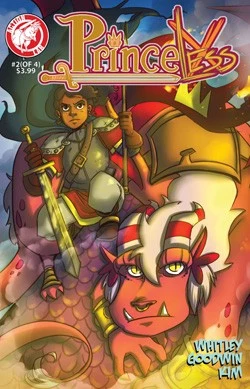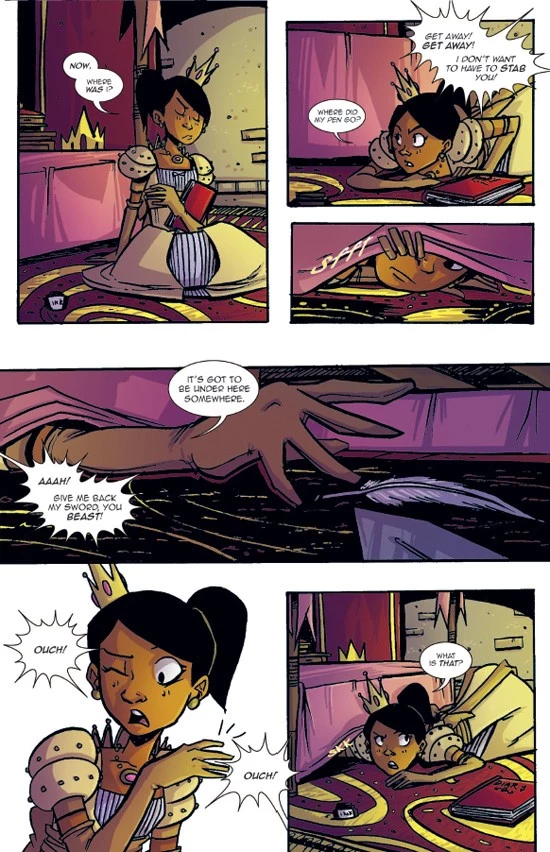
‘Princeless': A Fairy Tale Parody Where the Princesses Are Rescuin’ For Themselves

I'm pretty sure that if you went back and did the research, you'd find that the fairy tale parody genre entered literature about a half hour after the fairy tale itself. It's a pretty crowded field and has been for a while, and as a result, it's not often that you see something come along that makes it feel fun and fresh.
But with Princeless, that's exactly what Jeremy Whitley, M. Goodwin and Jung-Ha Kim have done with the story of a princess who decides to be the rescuer rather than the rescuee for a change. If that's a premise that sounds familiar, it's because it's been done a dozen times elsewhere. The whole princesses doin' it for themselves thing is a a twist on a formula that, in modern storytelling, has become as much of a formula as the one it's twisting. What sets Princeless aside is that it's using that formula to build a story that, in the first two issues, works beautifully in every respect.
If that's a premise that sounds familiar, it's because it's been done a dozen times elsewhere. The whole princesses doin' it for themselves thing is a a twist on a formula that, in modern storytelling, has become as much of a formula as the one it's twisting. What sets Princeless aside is that it's using that formula to build a story that, in the first two issues, works beautifully in every respect.
The short version is that it's just well done. It's one of those rare books where the creators just did everything right. There's great comedy, thrilling danger and fun action, it's got a personality that comes through both in Whitley's script and through Goodwin's appropriately cartoony, extremely expressive art. It's almost like they went down some kind of checklist for making comics and just ticked off the boxes as they got everything up to the appropriate level of quality.
But while everything's good, there's one area in particular that's great, and pushes Princeless over the top from something that's enjoyable to one of the most pleasant indie comic surprises of the year. Simply put, it's got some of the strongest character work I've seen in a long, long while.
A lot of that comes from Adrienne, self-rescuing princess in question. In most respects, she's built as the typical heroine of the subgenre, right down to the frustrations with the dimwits who surround her and the modern attitude, complete with the pretty much mandatory dose of being genre-savvy to boot:

It's the sort of scene that's difficult to pull off in an entertaining manner, because it's very, very easy to lay it on way too thick. If she's too wise to the tricks of her own story, or if all she does is complain and demonstrate how much smarter she is then everyone else around her, then it's hard to get behind her as a heroine. She becomes a mouthpiece for today's creators to yell at people who died five hundred years ago for writing bad stories, and that gets real old, real quick.
And that's exactly what doesn't happen with Adrienne. Whitley and Godowin don't just walk the tightrope, they make it look easy, and end up with a character that's instantly appealing. She's smart, she's determined, her anger and frustrations at her situation seem fully justified. Even an early brush with being self-centered is just the right flaw to show a little development in that first issue. When she finally frees herself, she doesn't just run off to leave the family she's so frustrated with to their own devices, she decides to free her similarly imprisoned sisters. It's a nice bit of selfishness that twists the formula again - It's the princess who's running off to slay the monsters and climb the towers. By the time she hops on her dragon and heads off to thwart her dad's plans to marry off his other daughters to an acceptably charming prince, we're completely on her side, and not just because the formula tells us that we should be.
But here's the thing: The great character work doesn't stop with Adrienne. Almost everyone else in the book feels well-crafted, too. Admittedly, its not like they're working with a cast of thousands, but the small group of characters Princeless is working with feels complete.
A lot of that comes down to Goodwin's art. I mentioned before that it's expressive, but the emotions that come across just from the facial expressions go a long way towards revealing character. Just check out what you can get from one character's face in one four-panel sequence:

It's one of the things that goes a long way towards making Adrienne herself so likeable, but it's every bit as illuminating when it comes to her father. As you might expect from the fact that he's a guy who locks his daughters up in towers with man-eating dragons for company in order to find a suitable son-in-law, he's the unambiguous villain of the story. Every time that we see him in the first issue and for most of the second, he's either scowling or doing something reprehensible like telling his kids how useless and disappointing they are, usually managing both at the same time.
But in a single panel in the second issue, when he's informed of Adrienne's "death," Goodwin gives him one quick moment where all of that cracks:

That one brief instant of hollow-eyed shock when he hears the news says so much. It certainly doesn't change his plans, and the next few panels see him shift back into being more angry that anyone would dare defy his absolute rule rather than being upset about his daughter dying, but the fact that it's there changes things.
It's a great little example of what comics can do when they blend words and pictures together to compliment each other, and it's also another interesting twist of the genre, where even the unrepentant villain might have some humanity to him too.
Of course, I did say almost everyone felt fleshed out, and the big exception to that is Adrienne's mother, who's more or less just set decoration with dialogue at this point. To be fair, it's only been two issues so far, but on the short list of the book's notable flaws, that's one of them. And really, I'm willing to forgive it if only because in the second issue, you find out that Adrienne's youngest sister is named "Appalonia," which gives me hope that her others will also be named after Prince's proteges.
More than anything else, it's a smart comic, and one of those solid all-ages books that never talks down to its audience. Even the pop-culture quipping that Adrienne occasionally indulges in -- there's a joke in the second issue about how a princess is in another castle -- comes off without the calculated, manufactured cynicism that tends to drag down something like Shrek and its increasingly annoying Shrekquels. I've been trying to avoid saying it because it's such an unforgivable pun, but there's no way around it: Princeless is charming.
The first issue -- which you can enjoy a five-page preview of below -- is available now in stores and digitally, and it's well worth your time to check it out and tell your local shop to hold the second issue for you when it hits in December. It's not just good stuff, it's the story Disney should've been telling for the past 20 years.






More From ComicsAlliance
![The Secret History Of ‘My Little Pony’ Is Finally Being Unearthed In ‘My Little Pony: Legends Of Magic’ [Exclusive]](http://townsquare.media/site/622/files/2017/01/MLP00.jpg?w=980&q=75)

![Don’t Stop Her Now: The Infectious Enthusiasm Of Whitley & Charretier’s ‘The Unstoppable Wasp’ #1 [Review]](http://townsquare.media/site/622/files/2016/12/Unstoppable_Wasp_Featured.jpg?w=980&q=75)

![Shrinking, Flying, Dancing And Science In ‘The Unstoppable Wasp’ #1 [Preview]](http://townsquare.media/site/622/files/2016/12/Unstoppable_Wasp_Featured.jpg?w=980&q=75)
![If You Love ‘Lord Of The Rings’, Try These Comics Next [Fantasy Week]](http://townsquare.media/site/622/files/2016/10/LOTR-LT3.png?w=980&q=75)



